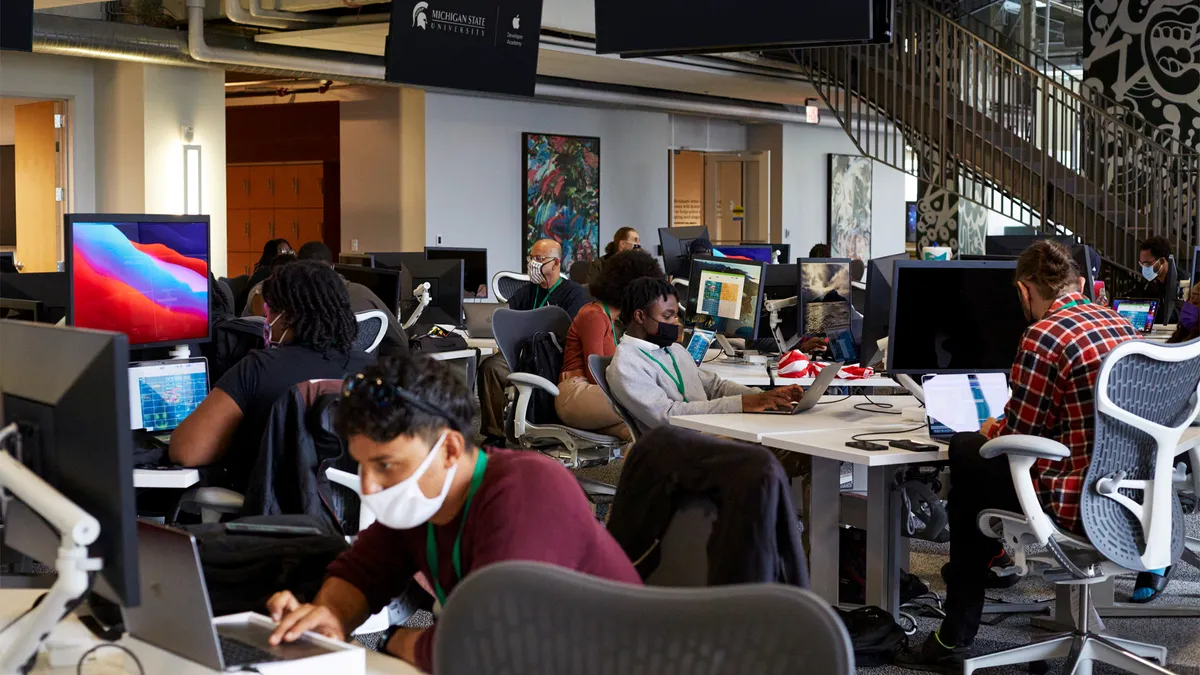As social justice protests continue and some employers work to address systemic racism, numerous organizations have reported a notable increase in participation and investment in training for diversity, equity and inclusion, according to data shared with HR Dive by LinkedIn, Udemy, Skillsoft and ExecOnline.
ExecOnline’s program, offered in partnership with Yale University and titled "Fostering Inclusion and Diversity," saw a 298% year-over-year increase in enrollment in the month of July and the upward trend has continued, with September’s enrollment at 357% compared to last year, according to Adam Brinegar, senior vice president and head of client solutions at the leadership training company, who also noted an increase in executive-level participation.
"It's a three week program, about 5 hours a week — and you have to do a project," Brinegar shared via email. "You are asked to make a substantial business decision in a more inclusive way. Across the course of the program, you'll do assignments in support of that project. So very different from the typical one hour unconscious bias training."
Part of the mission of ExecOnline, and other non-traditional learning providers, includes increasing access to learning with the goal of improving diversity across companies. "We think of all of the different offerings that we provide, whether it be strategy, innovation, finance, you pick the topic, as critical to the mission of creating more diverse leadership benches, because it democratized access to those experiences that were going to drive the skill sets that got people on to succession planning," ExecOnline CEO Stephen Bailey said.
Skillsoft said it saw similar growth. Company representatives shared that a course on unconscious bias training saw a 1269% increase in traffic and another course titled "Compliance Expert: Diversity - Its Value in the Workplace" had a 1054% increase in traffic. Overall, from May to June, Skillsoft saw a 367% increase in diversity content accessed on its site.
At LinkedIn, company representatives reported that two courses on bias were in the top ten most popular courses across all of LinkedIn Learning for the month of August. The company also said it saw learners engage with its "Diversity, Inclusion and Belonging learning path" nearly four times more from June through August compared to March through May. It also has additional courses in the works: "We have more than a dozen courses right now that we’re fast-tracking on topics around allyship, [...] microaggressions, and on supporting marginalized colleagues through this time," said Jolie Miller, head of business content strategy for LinkedIn Learning. "I think it's a journey that we're all on together."
Miller also said she sees HR professionals tying diversity to wellbeing. "HR and L&D pros want to meet this moment by offering relevant content," she said. "We're seeing that 69% of them are telling us that it's part of their job now going forward to really think about supporting that whole self to work on mental health and wellbeing of their employees."
Like ExecOnline, LinkedIn promotes an experiential aspect of the learning process. Miller and her team members are taking the aforementioned diversity learning track and discussing their takeaways together. "[We] know from our clients that supplementing that learning with discussion and reflection can be a really powerful tool to turn learning into action," Miller shared. "We are talking about that every single week. We're talking about learning reflections and about actions that we want to take as an organization as that accountability check."
Miller said the training and discussion allowed her team not only to absorb the material better, but also to start to apply the concepts to their everyday work. "One of the great learning moments we had this past month was reflecting on the course on unconscious bias and talking about all the different forms of bias that are out there," Miller said, "and sharing examples of when we might have seen bias in action, and how we might look at that bias a little bit differently with the increased learning and the increased awareness."
Similarly, Udemy said it saw an increase of more than 500% year-over-year in diversity and inclusion course enrollments across both its marketplace and Udemy for Business offerings, according to information the company shared with HR Dive.
"We know the customers who use Udemy for Business, and Udemy ourselves, are very interested in continuing to create content and provide access to learning around this topic," Shelley Osborne, vice president of learning at Udemy, said. "It's certainly not going away, and it shouldn't. This is one of the most important things we can do as organizations to support a diverse, equitable and inclusive company and world."
Like LinkedIn, Udemy said it sees opportunity for a more holistic view on the value of diversity, and a more nuanced approach that dives into deeper aspects of inclusion. "One of the things that companies have learned is [...] if you just focus on a little piece of this, you're not really making any progress," Osborne explained. "But it's also a marathon. This can't be something we do once and then we drop. Other topics that I think are really important are supporting psychological safety, supporting that belonging aspect [...], but also self-advocacy. Teaching those types of skills and allyship is really, really critical. It's an all encompassing approach, and it can't just be a one and done."
Ultimately, as interest in training on diversity, equity, inclusion and belonging has increased, corporate training is shifting. Development on this subject, as with many others that are critical to business success, must be detailed and ongoing, she said. "You have to be thinking about these things, drawing on those learnings and revisiting them over time," Osborne said. "There's no sort of, 'Oh, I took the unconscious bias training. So I'm good. I'm done.' [...] That's not going to cut it. My recommendation would be for organizations to think through long-term strategies and recognize that there are no easy answers to hard questions."
As businesses continue to come around on the importance of these topics, they will also need to hold leaders accountable for delivering results, especially given the increased investment, according to Brinegar. "In the past, I would say that people viewed D&I programming more as PR and were looking for something quick and easy to show the market they cared," Brinegar said. "Whereas now, there's a serious shift toward learning. [We are] hearing more and more that senior leaders feel they will be held accountable for D&I."



















